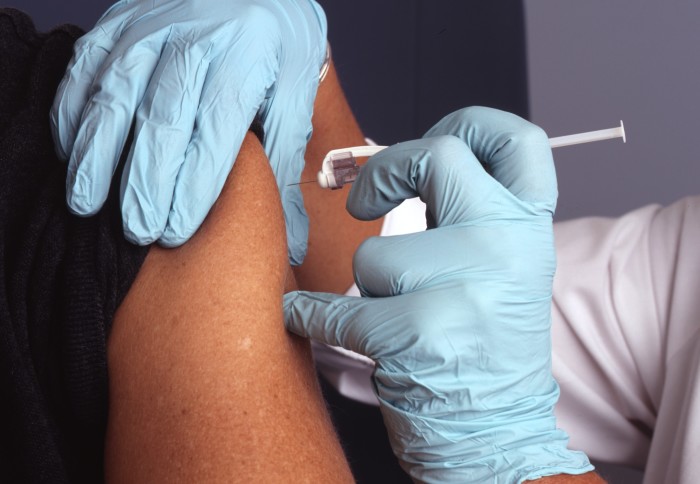COVID-19 vaccine confidence is growing, global survey suggests

People’s willingness to have a coronavirus vaccine is increasing across the world, according to a new report on attitudes towards COVID-19 vaccines.
A survey of 14 countries* which ran between November 2020 and February 2021 found that almost 6 in 10 people (58%) would take a vaccine if it was offered to them now and that willingness has risen in 9 of the countries.
Led by Imperial College London’s Institute of Global Health Innovation (IGHI) in collaboration with YouGov, more than 13,500 people took part in each survey, which has also highlighted major differences in attitudes towards vaccines around the globe.
"Our data shows that many countries still have much to do to address vaccine hesitancy." Prof Ara Darzi Co-Director, IGHI
According to the most recent survey, which ran between 8th and 21st February, people in the UK are most willing with almost 8 in 10 (77%) stating they would take a vaccine if one was available to them the week they took the survey. This is up from 55% in November, shortly before the first COVID-19 vaccine was approved. Whereas France, Singapore and Japan have consistently remained among the least willing and have the smallest shares of people who would currently take one at 40%, 48% and 48%, respectively. However these countries have all grown in confidence since November when only 25%, 36% and 39% of individuals were willing, respectively.
France has also consistently had the highest share of respondents who strongly disagree that they would take a vaccine, currently at 3 in 10 (33%), down from 42% in November. Among all other countries surveyed, the proportion of people strongly disagreeing has decreased or remained relatively constant.
The survey also shows that worry over vaccine side effects has declined in the majority of countries, with fewer than half (45%) of respondents currently reporting concern. France, Singapore and Japan are currently most worried about side effects with around 6 in 10 feeling concerned (56%, 59%, 61%), while the UK is the least (26%).
Professor Ara Darzi, co-director of the Institute of Global Health Innovation, said: “With a number of safe and effective coronavirus vaccines being rolled out across the world, and many more in the pipeline, it is good news that people are becoming more willing to take one. But our data shows that many countries still have much to do to address vaccine hesitancy; it is vital that leaders understand why their citizens have concerns and develop tailored strategies to address these.”
Access to COVID-19 vaccines
The report, led by IGHI's Melanie Leis and Sarah P Jones, is part of a major ongoing effort to monitor changing patterns of health-related behaviours and attitudes during the pandemic. Since April 2020 the researchers have surveyed half a million global citizens so that leaders can plan public health responses based on their country’s needs.
"This is a global pandemic and no country is isolated from the ongoing situation; getting to a new normal will require a concerted effort to ensure no nation is left behind." Sarah P. Jones project co-lead, IGHI
The most recent survey, carried out with contribution from the WHO working group on measuring behavioural and social drivers of COVID-19 vaccination, shows that more than half of people (54%) report that they’d regret not taking a vaccine if offered one, a figure that has grown in 11 countries.
A similar share (56%) also currently express confidence that their government can deliver an effective vaccine, which grew overall across the countries surveyed between November and January but has since declined in Denmark, Italy, Norway and Sweden. Yet more than half (55%) report that it would be hard for them to access one, a figure that has remained relatively consistent since November. Israel currently has the largest number of respondents who said they would not have difficulty accessing a vaccine (64%), while Germany, France and Canada have the smallest (35%).
Sarah P Jones, co-project lead and doctoral researcher from the Institute of Global Health Innovation, said: “While the availability of COVID-19 vaccines is increasing in many countries, this is a global pandemic and no country is isolated from the ongoing situation, so getting to a new normal will require a concerted effort to ensure that no nation is left behind. Leaders must work together to ensure vaccine equity which will be a vital step in the path out of the pandemic.”
Vaccines provide the best protection against COVID-19 and a number of coronavirus vaccines are now approved both in the UK and globally. Imperial College London has developed self-amplifying RNA vaccine technology to target the virus which is now being explored for its potential to target new variants of SARS-CoV-2 or other viruses as they emerge.
Notes
*Countries included in this global comparison are as follows: Australia, Canada, Denmark, France, Germany, Israel, Italy, Japan, The Netherlands, Norway, Singapore, South Korea, Spain, Sweden, and the United Kingdom.
Visit the open data dashboard: www.coviddatahub.com
Article text (excluding photos or graphics) © Imperial College London.
Photos and graphics subject to third party copyright used with permission or © Imperial College London.
Reporter
Justine Alford
Institute of Global Health Innovation